Judge Marchena joins an offensive book against the Executive | Spain
Judge Manuel Marchena likes photography. Every year, for Christmas, he sends to his WhatsApp contacts a image gallery of the Supreme Court taken with his latest generation mobile phone. The portraits – of the hearing rooms, of the offices still chaired by large crucifixes, even of Madrid’s sunsets – appear inspired by the word solemnity. Nothing to do with the cover of the book that the judge – until last December of the Supreme Second Chamber and now one more magistrate of the same court – has just published. It is titled Threatened justice, Thus, in capital letters, on a black background of togas tied with chains.
It is striking that, after the introduction – in which Marchena already warns that « political power has not overcome the temptation to weaken the constitutionally conceived mechanisms for the democratic control of their decisions » -, the first chapter is titled precisely: « Is the Prosecutor’s Office Who does it depend on? Well, it is already… ”. The phrase was the response given by the president of the Government, Pedro Sánchez, in a radio interview. It is, however, the only allusion expresses to a high political representative or some of the controversial matters of today. Marchena knows better than anyone than any explicit, or even implicit reference, to issues such as the amnesty of the Government to the Catalan independentistas condemned by him Proces – to the one that does not even refer to the book – could lead to his challenge as a magistrate of the Second Criminal Chamber of the Supreme Court, where the alleged cases of political corruption are judged precisely, such as those who now concern the State Attorney General, Álvaro García Ortizor the former minister José Luis Ábalos.
Manuel Marchena (Las Palmas de Gran Canaria, 66 years old) is perhaps the most relevant magistrate of the Spanish judiciary, not only for having been at the head of the Second Chamber of the Supreme Court for 10 years – since October 2014 to December 2024 – but for his ability to influence, inside and outside the judicial field. In 2018, Marchena was about to become president of the General Council of the Judiciary (CGPJ) and the Supreme Court under a pact between the PSOE and the PP according to which the Socialists – and their partners in the government – would have 11 vowels and the popular ones, only nine. In exchange for allowing a « conservative » president, the PSOE secured a progressive majority, but the agreement went to the disorder when a message from the then spokesman of the PP in the Senate, Ignacio Cosidó, in which he implied that, with Marchena, the conservatives would control the criminal hall of the supreme criminal « From behind. » To clear any questions about his honorability, The magistrate resigned from his candidacy And, just a few months later, he presided over the court that tried and condemned those responsible for the secessionist attempt.
It was that trial – related live – that made it a media figure, and where they highlighted a set of virtues that, skillfully managed in public and private, give it great predicament. During those 52 sessions, Judge Marchena not only demonstrated a great knowledge of the summary, but also a providential left hand, a sense of humor and a scenario control that allowed the trial, despite the high political and media tension that surrounded him at all times, he would reach fruition. For all this, it is striking that now – in the final stretch of his career and when he says he has renounced any other position of institutional relevance – Manuel Marchena breaks into the scene with a book that aims to invite a serene debate, necessary and away from Manichaeism that dominates the current discourse about the judicial world ”, but whose cover and some statements are inferred the opposite message. Justice is threatened. He does not say it openly, or rather does not point out a single guilty, but slides budgets like these: “Every year more than three million issues in criminal jurisdiction begin. The debate on the politicization of the Fiscal Ministry does not reach more than a dozen of them who, due to the affectation to one or another political responsible, arouses the media interest and the consequent citizen monitoring (…). The political power is indifferent to the outcome of those thousands of judgments that are celebrated every day, but it has an inocable interest in that this dozen criminal proceedings that may affect their interests are strongly controlled by the Attorney General. ”
It is true that, neither in this nor in other matters that collects the book – the popular accusation, the measures against gender violence, the right to privacy of the accused, freedom of information, the aforement Deep, on whom Spain governs in recent years. A discomfort that undoubtedly has much to do with some of the decisions taken by the Government of Pedro Sánchez, especially in relation to the amnesty to the leaders of the Procesbut that also occurs just at a time of great tension and in which Isabel Díaz Ayuso has touched Rebato so that, as José María Aznar said, everyone who can do it. « They are doing it, » according to the Madrid president, « judges, prosecutors and journalists. »
Marchena’s book (edited by Espasa) lands just in that mudagal and only a month and a half later – how also by chance – of having pronounced these words: “I would not want to drag them with me to the pessimism in which I install when I analyze where we are and where we go, but I want concern. The day that said that, Marchena was touched with Doctor’s Birrete Honoris Causa granted by the CEU Fernando III University, owned by the Catholic Association of Propagandists (ACDEP). As they say in the Gospel of Matthew: « He who wants to understand, who understands. »





:format(webp)/s3/static.nrc.nl/wp-content/uploads/2024/01/12154825/data110061737-a8fdf7.jpg)

